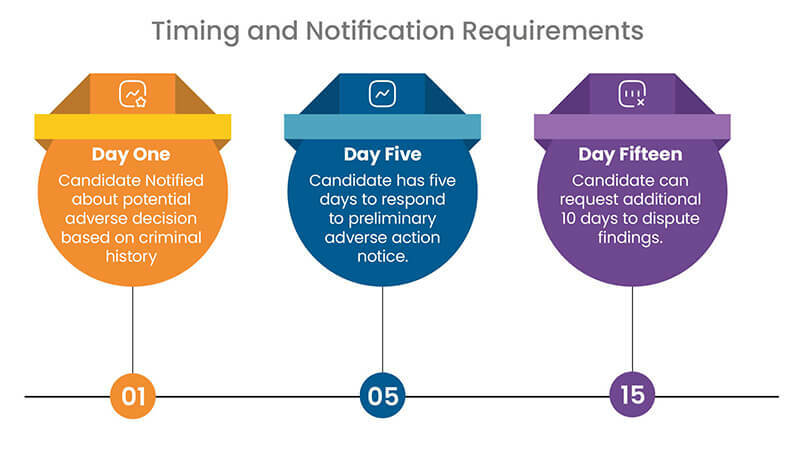With the September 3, 2024, deadline fast approaching, employers operating in the unincorporated areas of Los Angeles County (ULAC) must prepare to comply with the new Fair Chance Ordinance for Employers. This regulation introduces several significant changes to the hiring process, especially for businesses that inquire about or consider criminal history when making employment decisions. To ensure compliance, it's crucial for employers to understand these new requirements, adjust their policies, and implement the necessary changes in their hiring practices.

Understanding the Scope of the Ordinance
The Fair Chance Ordinance for Employers applies to businesses and remote employees located within ULAC. This broad coverage means that even employers outside the City of Los Angeles or other incorporated cities in the County (e.g., Santa Monica, Long Beach) must comply if they have employees working in the unincorporated areas. The ordinance's reach includes various worker categories, such as freelance workers, contractors, and individuals engaged in educational or vocational training. Employers can use the County’s online tool to determine whether a specific location or employee falls within the ULAC jurisdiction.
Key Compliance Requirements
One of the most critical aspects of this ordinance is the change in how and when employers can inquire about an applicant’s criminal history. Under the California Fair Chance Act (CFCA), employers could not consider criminal history until after a conditional job offer was made. The ULAC Ordinance takes this a step further, prohibiting employers from asking about criminal history until after the candidate has received a copy of their background check report. This unprecedented change requires employers to revise their background screening procedures and remove any post-offer criminal history inquiries from their systems.
Employers must also update their job postings to reflect compliance with both the ULAC Ordinance and the California Fair Chance Act. Any statements suggesting that candidates with criminal records will not be considered for employment are prohibited. Employers must explicitly state that applicants with arrest or conviction records will be considered in line with these regulations. Additionally, the ULAC Ordinance requires job postings to include a list of all material job duties where criminal history might adversely impact the candidate’s ability to perform the job. This new requirement sets the ULAC Ordinance apart from other fair chance laws, demanding more transparency from employers during the hiring process.
Timing and Notification Requirements
The ULAC Ordinance introduces specific timelines and procedures that employers must follow when conducting criminal background checks. Initially, candidates have five business days to respond to a preliminary (pre-adverse action) notice, which informs them of the potential adverse decision based on their criminal history. If the candidate disputes the accuracy of the information or needs additional time to gather evidence of rehabilitation or mitigating circumstances, they are granted an extra ten business days. It’s important to note that these timelines are calculated from the date the notice is “received,” which can vary depending on the method of delivery—whether mailed, emailed, or both.

Individualized Assessments and Adverse Action Notices
The ULAC Ordinance also places a stronger emphasis on individualized assessments. When considering a candidate’s criminal history, employers must provide a written assessment detailing how the criminal record is directly related to the job in question. If the candidate submits additional evidence of rehabilitation or mitigating circumstances, a second individualized assessment must be conducted and included with the final (adverse action) notice. This final notice must not only inform the candidate of the adverse decision but also advise them of their rights to challenge the decision through the Los Angeles County Department of Consumer and Business Affairs.
The types of criminal history information that employers can consider are also restricted under the ULAC Ordinance. Employers are prohibited from considering convictions older than seven years, infractions unless driving is a significant part of the job, convictions for conduct that has been decriminalized, and certain diversions or deferrals. These limitations require employers to carefully review their policies to ensure they only consider permissible information when making employment decisions.
Preparing for Compliance
With the September 3, 2024 deadline approaching, employers in ULAC must review and adjust their background screening practices to align with the new ordinance. This includes revising their criminal history inquiry policies, updating job postings, and ensuring that all pre-adverse and adverse action notices meet the new requirements. Engaging experienced legal counsel to navigate these changes can help ensure compliance and avoid potential legal issues. By proactively adapting to these regulations, employers can foster fairer hiring practices, promote a more inclusive workforce, and stay ahead in the complex landscape of employment law.
How DISA Can Help
Navigating the complexities of the ULAC Fair Chance Ordinance for Employers can be challenging, but DISA Global Solutions is here to assist. While we cannot provide legal advice, we provide guidance and tools that can help you align your hiring practices with state and local laws. Our industry experts can help you refine your background check packages, offer insights into best practices for maintaining compliance, and provide resources and sample documents to help guide your compliance efforts. With DISA, you have a partner dedicated to helping you navigate the evolving landscape of employment law.
Related Articles
About DISA Global Solutions
Founded in 1986, DISA is the industry-leading provider of employee screening and compliance services. Headquartered in Houston, with more than 35 offices throughout North America and Europe, DISA’s comprehensive scope of services includes drug and alcohol testing, background screening, occupational health, and transportation compliance. DISA assists employers in making informed staffing decisions while building a culture of safety in their workplace.



